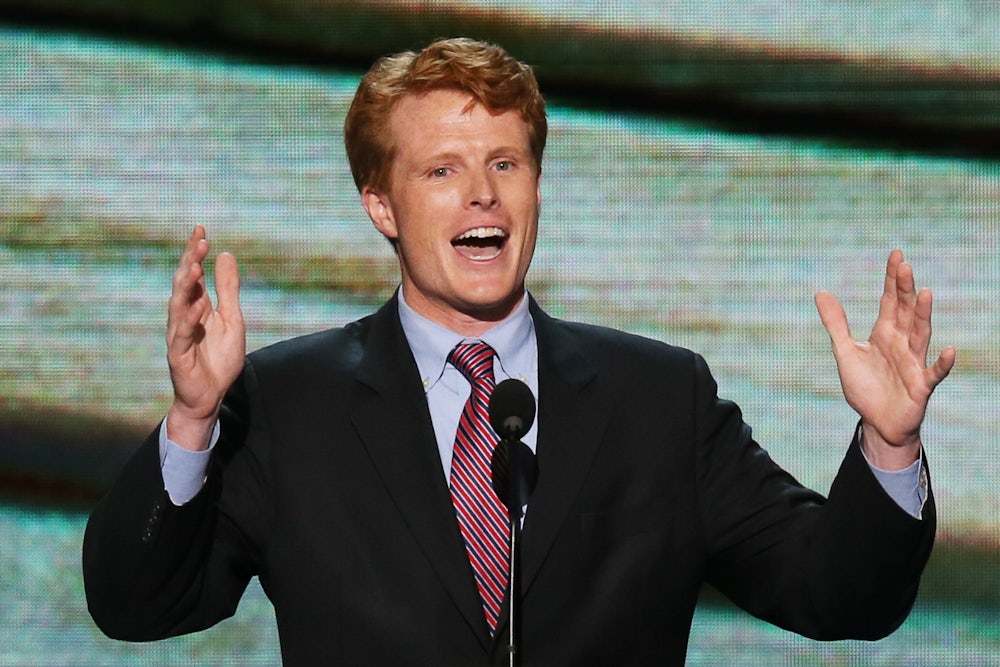Immediately following President Donald Trump’s first State of the Union address on Tuesday night, Senator Bernie Sanders was staring into a video camera, wearing his usual exasperated frown. “Tonight, he avoided some of the most important issues facing our country and the world,” he said about Trump. “How can a president of the United States give a State of the Union speech and not mention climate change?”
Sanders had a right to be frustrated with the president. Record-breaking hurricanes, extreme flooding, and raging wildfires wreaked emotional, economic, and environmental havoc on America last year. Each of these horrors were fueled by climate change—a problem caused by humans, but which is also fixable by humans, if there’s the political will. And yet, Trump didn’t even mention it. He spoke of the year’s record-breaking weather events as if they were merely occasions for American heroism, while promoting the proliferation of our dirtiest energy source.
But if Sanders should be angry at anyone, it’s the Democratic Party. His speech, broadcast on his Facebook page, was one of five rebuttals of Trump, only three of which mentioned climate change—the others being Congresswoman Maxine Waters, who gave her response on BET on Wednesday night, and former Congresswoman Donna Edwards, who spoke on behalf of the Working Families Party. The official response to Trump from the Democratic Party, by Congressman Joe Kennedy of Massachusetts, didn’t mention climate change once. Neither did Virginia state lawmaker Elizabeth Guzman, who gave the Spanish-language response. The same goes for most elected Democrats who responded to Trump’s speech on Twitter and in the media. Even Sheldon Whitehouse, the Senate’s most aggressive climate hawk, ignored climate change in his press statement.
After some of these omissions were reported by HuffPost, Breitbart erupted in glee. “‘Climate change’ just officially ceased being an important issue in U.S. politics,” the far-right site declared. “#Winning!” That’s obviously not true; climate change remains an important issue in U.S. politics, and in Americans’ lives. And yet, the Democratic Party still considers it an optional topic of discussion—even after Trump spent his year ripping climate policies to shreds. If Americans want to hear about that from elected Democrats, they have to turn on BET at 10 p.m. or watch a Facebook livestream.
But the Democrats’ omission not only allows climate-change deniers to falsely claim victory; it also alienates the growing number of voters motivated by climate change, especially within the Democratic Party. A Kaiser Family Foundation poll last week found that Democratic voters ranked climate change sixth among the top issues in the coming midterm elections. As Pew Research reported on Monday, “Nearly seven-in-ten Democrats (68%) say dealing with climate change should be a top policy priority, 50 percentage points higher than the share of Republicans who say so (18%).”
“Climate change has the potential and may even be likely to be a driving issue in some 2018 elections,” said Nathaniel Stinnett, founder of the Environmental Voter Project, a nonprofit that uses behavioral data to persuade environmentalists to go the polls. Whereas self-identified environmentalists have tended not to show up in midterms in the past, Stinnett believes this year will be different, particularly in places that were hit recently with extreme weather. “The hurricanes and wildfires and droughts of 2017 will definitely be felt at the polls in 2018, particularly in Florida and the Southwest,” he said.
Some believe this is already happening in deep-red Texas, after the devastation wrought by Hurricane Harvey. Daniel Cohan, an associate professor at Rice University, wrote in the Houston Chronicle this week that 400 people attended a forum for Democratic congressional candidates to talk about climate. Cohan also noted that recent surveys “debunk the misperceptions of voter apathy on climate”:
A survey by Harvard and Politico showed that Democrats rank climate change neck-and-neck with healthcare and Trump-Russia allegations as the top issues motivating their vote in 2018. Another survey showed that even most Republicans wanted President Trump to remain in the Paris Climate Agreement. That’s why I’ve asserted climate action could be an issue that motivates Democrats without alienating Republicans.
Changing demographics play a role, too. As Stinnett has pointed out before, “recent studies show that young people (ages 18-29) and Latinos are far more likely to care about climate change than any other demographic groups”—and both have been steadily increasing in turnout. This is especially meaningful for upcoming gubernatorial and congressional races in Florida, where 300,000 Puerto Ricans have relocated because of Hurricane Maria. “I’ve got to think that these hundreds of thousands of displaced Puerto Ricans will be climate voters,” Stinnett said.
Ignoring climate change is not only a missed political opportunity, but a missed policy opportunity. Climate change policy now happens almost exclusively on the state level, and there are 39 states with gubernatorial elections in 2018. That’s 39 opportunities to elect climate-friendly executives who can, with the stroke of a pen, transform a state’s greenhouse gas emissions trajectory. In fact, that’s exactly what happened this week, when newly elected New Jersey Governor Phil Murphy signed an executive order mandating that the state reenter the Regional Greenhouse Gas Initiative, a cap-and-trade system. Murphy campaigned on climate-friendly policies, and one week after being sworn in, he put the state on a path toward leadership in the climate fight.
For this to happen in other states in 2018, voters can’t just elect Democratic governors. They have to elect governors who are specifically promising to tackle climate change, like Murphy did. That’s less likely to happen if the Democratic Party, which provides resources for these races, is fine with politicians who ignore the issue. Trump has created an environment where more voters want climate action than ever—all Democrats have to do is start listening to them.
